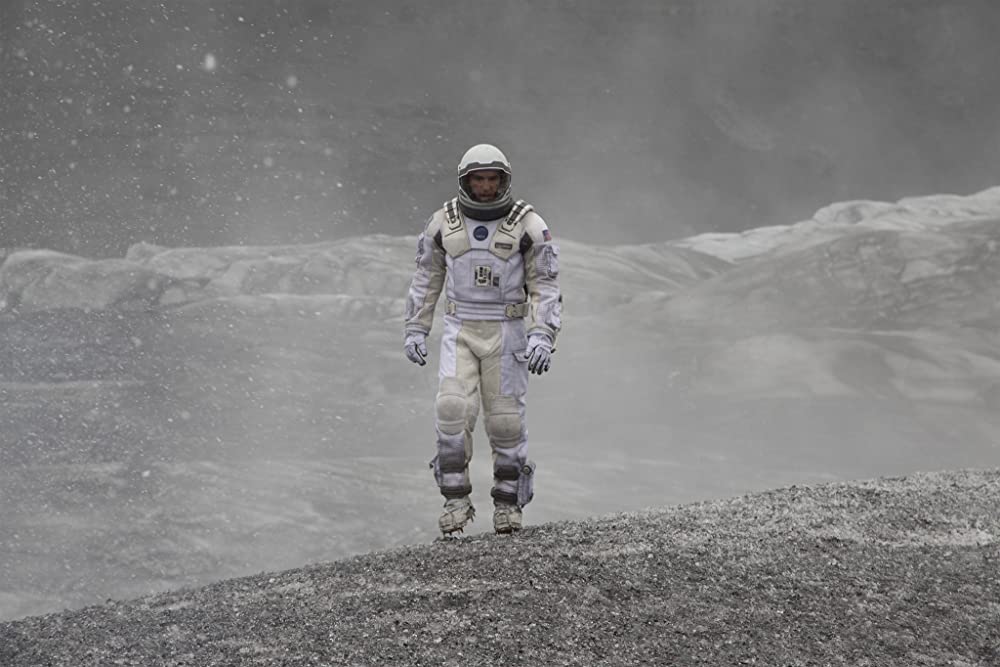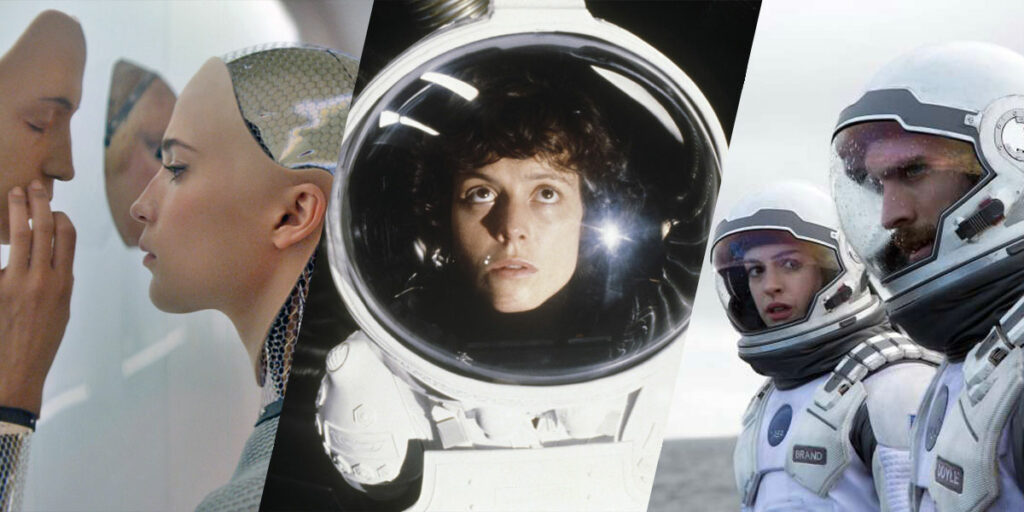Science fiction has shown itself to be the best genre in film by combining the real and unreal in countless exciting and impactful ways. Here’s why.
In one way or another, everyone has had at least some exposure and experience with the science fiction genre. It’s pretty much impossible for someone to avoid it with how much it’s ingrained itself into our popular culture across every medium of art, from centuries-old texts to modern films. Some people may say they’re not fans of science fiction or even dismiss it as nothing more than a gimmick, but I think they’d be hard-pressed to look deeply into their history with entertainment and not find something in the genre that left a meaningful impact on them. I’ve definitely had more than a few such instances … so much so that, for years, I’ve considered science fiction to be the best genre of storytelling, particularly in film. If I were to list my favorite films of all time, science fiction would be the most common type to pop up. It’s inspired my imagination in a variety of ways from childhood through adulthood, and it allows for seemingly endless possibilities that fall nicely into the sweet spot of my personal tastes in media.
So, I want to celebrate science fiction by exploring what defines it, what makes it so special to me, and why I think it’s the best film genre that’s just as important and relevant now as it’s ever been!
WHAT DEFINES SCIENCE FICTION?

First, it’s best to properly establish what I consider to define science fiction as a genre. Science fiction is exactly that: science and fiction. It’s taking the setting, rules, and science of our real world and, to varying degrees, adding some sort of fictional spin to them. It’s not completely driven by undisputed fact, but it’s also not based entirely on the ideas of the artists. I think that, for something to be science fiction, the starting point of its conception has to be pure reality. The environment, history, and rules of the story all need to be rooted in what we know without question to be fact in our world. So, films like Star Wars or Dune don’t count in my eyes, as their universes are pretty much designed completely from the ground up, making them pure fantasy. The best way I can think to succinctly put it is that science fiction injects something fictional into reality, rather than having reality be put into something fictional.
Once those ground rules are defined, that’s when the fiction comes into play, able to be implemented in any number of ways. You can bring in one or two elements that haven’t been proven to exist in our universe yet, like time travel or intelligent alien life. You can have the story take place in the future with multiple technological innovations that we’ve yet to experience and may never see. You can take some known natural occurrence and distort or twist it around, or have the setting be an alternate reality with a few select changes while everything else is true to our world.
Additionally, all of those changes to reality should have at least some basis in pre-defined scientific concepts. This is why certain horror films like Annihilation and Alien, for instance, can also count as science fiction, as their horror elements are consistently linked to scientific and biological phenomena like cellular alterations and extraterrestrial life, whereas other horror films like The Conjuring or Hereditary don’t count because their fictional aspects are rooted solely in the supernatural. Like a lot of genres, the line can be blurry at times, but these are the criteria as I’ve come to accept them.
THE BEST OF BOTH WORLDS: BALANCING SCIENCE AND FICTION

So, what is it about science fiction that makes its appeal so instant and long-lasting to me and many others? Above all else, what I love most about science fiction is its ability to balance the strictly real with the strictly unreal to, when done properly, get the best of both worlds. In fantasy films and other such stories, creators can make up almost any rules and lore that they want, not needing to worry about whether or not it adheres to what someone else says is fact. While this allows imaginations to run wild as audiences are transported to entirely new worlds, it also creates a potentially higher barrier in getting people invested in those worlds. In the science fiction genre, the “real world” needs to be recognizable to at least some degree. As a result, it’s often a lot easier to connect to the settings and environments on a much more relatable level. There’s not nearly as much ground work that needs to be laid out that could potentially alienate us, and there aren’t nearly as many hurdles to jump through in selling us on the world being portrayed, because … well, it’s our own world, or at least a variation of it.
Plenty of straightforward dramas, action movies, and other kinds of films centered in reality have this same advantage, but what elevates science fiction as the best genre in that regard is that, at the same time, you also get the fun of messing around with that reality. Science fiction has the privilege of being able to twist, distort, or even outright change the pre-established real world to dazzle, frighten, or mystify the viewer with something they’ve never seen before. It can be as small as Ex Machina, where an artificially intelligent creation the likes of which we’ve yet to achieve can be brought to life for us to observe, think about, and even connect with on an emotional level because of how startlingly realistic it feels. Or it can be as grand as Inception, where the protagonists literally enter people’s dreams, resulting in exhilarating action sequences that couldn’t have worked had the film not played with reality in any way … while still having a starting point in reality that everyone is familiar with to make it feel more believable.
Science fiction at its best allows for the identifiable connection of something more grounded, and the wonder and memorability of something more heightened, all at once. It can definitely be a difficult tightrope walk, as you run the risk of the made-up or exaggerated parts of the story clashing with what’s supposedly more realistic. I think this is a big part of why some people say they don’t watch science fiction. They’ve likely been exposed to too many instances where these two sides clash and found them too off-putting. But that only makes it more impressive when the balancing act is pulled off. How does someone take the ordinary and believably twist it into something extraordinary? What doors are suddenly opened by mixing the real with the unreal? How does that change the motivations of the characters in the story…, and, by extension, what does that say about how we would behave if we experienced these changes in our actual lives? In the right hands, the potential for greatness in the genre is far higher than some may initially think.
SCIENCE FICTION SPANS MULTIPLE GENRES

Another one of my favorite aspects of science fiction is its versatility across multiple different genres. Think about some of the best, most iconic science fiction films ever made. The Thing, Back to the Future, 2001: A Space Odyssey, Inception, 12 Monkeys, Eternal Sunshine of the Spotless Mind … these films are all so distinct from one another, ranging from pure horror to pure comedy to dark satire to fun action. Yet all of them are classified as at least partially science fiction, if not entirely. They all retain the essentials of what makes science fiction what it is, but they use those essentials to create very different experiences. Some of them are meant to be taken stone-cold seriously, some are happy-to-lucky crowd pleasers, and some fall in between, that last case requiring a balance of fun and serious within the balance of science and fiction. Regardless, these and other diverse entries in the genre all aim to do the same thing: bring something abnormal into normalcy and see how the world and characters deal with it.
I would even classify some comic book films as science fiction. Maybe not the purely grounded ones like The Dark Knight or those that heavily involve the supernatural like Doctor Strange, but the X-Men film series absolutely counts, since it establishes the existence of mutant human beings while otherwise keeping our own world and history intact. The same thing applies to a lot of monster movies, like Godzilla, whose titular creature is unleashed through scientific means and combated through science as well. Both of these films use their sci-fi conventions as means to portray and comment on real and important subjects – prejudice and identity in X-Men’s case, and nuclear warfare and natural destruction in Godzilla’s – giving them the social relevance that most of the best science fiction is known for.
Because of how universally applicable science fiction is to a wide range of genres, I question those who say they’re not really into it. Granted, I think that when a lot of people in the general public hear the term “science fiction” or “sci-fi”, it’s natural for their thoughts to immediately turn to some of the sillier, campier popcorn films of the genre. Big crowd-pleasing blockbusters like Independence Day, Back to the Future, or The Fifth Element are usually the most widely-recognized science fiction films to the population at large, and as a result, I think many people have a limited perspective of what science fiction can really be. I’m not at all saying that these are lesser films, just that they don’t represent the wide spectrum of what the genre is capable of. If anyone is looking for something more serious and intellectual, for instance, they may not think to turn to science fiction because of these kinds of preconceptions.
But no matter what your tastes are, I guarantee that there’s something in the sci-fi genre that’s right up your alley, which is something I can’t say for many other genres. Even horror, which is also very versatile in what can be done with it, has its limits on who will enjoy it, as not everyone is going to like being scared, disturbed, or shocked in any capacity. The action genre similarly won’t appeal to those who see no appeal in violence or destruction as entertainment, so even the best films of that genre have a limited reach. Science fiction doesn’t have a ceiling like that. It has something for everyone and can fit into whatever someone’s tastes may be, maybe even expanding their tastes by serving as a gateway to more surreal ideas outside of their comfort zone. I think that anyone who says they don’t care much for sci-fi simply hasn’t found the stories that are right for them yet.
THE DIFFERENT LEVELS OF SCIENCE AND FICTION

Such broad appeal raises questions regarding the merits that come from how much you focus on the science and how much you focus on the fiction of any given sci-fi film or story. Sometimes the more “realistic” an exploration of certain concepts is, the more startling it is to see it taken to unproven extremes. Interstellar, my favorite film of all time, makes amazing narrative use of gravitational time dilation. In the film, astronauts travel across galaxies and are exposed to the gravitational effects of a black hole that cause them to age decades more slowly than their loved ones on Earth. Though Interstellar absolutely takes liberties with a few of its scientific concepts, this is a phenomenon that actually happens, and the film heavily leans into the details of how it works. And because it’s portrayed as closely to proven fact as possible, the emotional impact and frightening nature of the situation are so much more palpable, audiences perhaps learn about something they’d never have thought was possible, and the film’s few forays into unprovable fiction have a lot more weight to them.
But it’s one thing to have only a few aspects of science be exaggerated. What about when an entire world is drenched in that exaggeration? The Blade Runner films technically take place in versions of our own world, but there are so many visual differences and advanced technological feats that they sometimes don’t even resemble our world. But they’re meant to portray the futures of the times they came out, and the future is open to a lot of different interpretations because we obviously don’t know what it entails. Seeing someone’s imagination of what present-day problems could possibly amount to in the future is often the best source of commentary for “cyberpunk” films like these, with Blade Runner and Blade Runner 2049 showing us environmental devastation, the line between life and machinery, and the god complexes of those in power, all of which were valid concerns then and are even more relevant now.
Some science fiction films start out fully centered in reality before dipping themselves into the complete unknown. Arguably the most prolific film in the genre to do this is 2001: A Space Odyssey. This classic starts out looking like a pretty believable take on human life in space, but it then introduces HAL 9000 as an artificial intelligence who runs amok trying to keep order and maintain the illusion of his perfection. The film then ends with one of the most trippy, bizarre sequences ever that comes solely from the minds of the filmmakers. These three segments vary wildly in how far-fetched they are, covering so much of science fiction’s range within a single film to explore how humanity’s search to advance themselves may end with those advancements overpowering them. The ending has no clear meaning, but I see it as the ultimate culmination of someone learning all that they can and realizing how small they are as a result. An infant in the grand scheme of things, if you will.
THE IMPORTANCE OF SCIENCE FICTION IN FILM AND BEYOND

As the popular saying goes, truth is often stranger than fiction. The universe is a challenging, complicated, and ambiguous place, whether it comes to our own human nature, events and shifts in landscapes and societies, or what lies beyond our understanding and awareness. Obviously, film and other artistic mediums are at their most powerful when they dig deep into these concerns and help us either make sense of them or, at the very least, think more deeply about them. Science fiction has proven to be no exception to this throughout history, and I consider it to be the best, mosteffective form through which to tell such stories. It gets people’s attention with creativity and spectacle, and it uses that as a gateway to explore a huge variety of profound questions and subjects viewers may have never considered before.
Don’t get me wrong, pretty much every genre has accomplished this in some way. But because of the blend of fact and fiction that science fiction not only heavily hinges on but often puts so much emphasis on, and because any and every point in time has a treasure trove of potential for the commentary science fiction provides, I believe science fiction is the genre in which those accomplishments come the most naturally. It’s also arguably one of the first “genres” to make it big with societies at large. As early as the original Frankenstein novel or as recently as Everything Everywhere All At Once, science fiction has always had something new and jaw-dropping to entrance audiences and make them think more deeply about the nature of their own lives and surroundings. And as long as there are storytellers who continue to tap into that, science fiction will remain the genre I consider the best and hold in the highest regard and importance.

